Politics
Erdoğan urges UK PM Starmer to press Israel for Gaza cease-fire
President Recep Tayyip Erdoğan told U.K. Prime Minister Keir Starmer on Monday that the humanitarian situation in Gaza has reached a critical point, urging concrete steps to pressure Israel into a cease-fire and a two-state solution, as he welcomed the latter’s recent remarks on Palestine, the Presidential Communications Directorate said.
In a phone call, Erdoğan said it is a duty to humanity to move beyond merely voicing concern over the crisis.
He noted that Türkiye continues to send humanitarian aid to Gaza and supports mediators’ efforts to secure a cease-fire and advance negotiations.
The president also congratulated Starmer for his recent remarks on recognizing the State of Palestine.
Last week, Starmer said that the U.K. would recognize a Palestinian state in September unless Israel agrees to a Gaza cease-fire, permits U.N. aid deliveries, and takes further steps toward lasting peace.
Pressure to formally recognize Palestinian statehood has mounted since French President Emmanuel Macron announced that his country will become the first major Western power to recognize a Palestinian state in September.
More than 250 of the 650 lawmakers in the House of Commons have signed a letter urging the government to recognize a Palestinian state.
More than 140 countries recognize a Palestinian state, including a dozen in Europe. Macron’s announcement last week make France is the first Group of Seven country and the largest European nation to take that step.
Gaza’s 2.3 million residents face an unfolding humanitarian nightmare marked by widespread hunger, shortages of water, medicine and hygiene supplies due to Israel’s ongoing blockade and atrocities.
Since Oct. 7, 2023, starvation has claimed more than 145 lives, including 88 children, in Gaza, where local and international observers accuse Israel of weaponizing hunger and thirst.
Israeli forces have destroyed 88% of Gaza’s civilian infrastructure and regularly bomb displaced Palestinians forced from their homes by repeated orders of expulsion.
More than two million Palestinians have been displaced multiple times, living in makeshift tents or overcrowded shelters lacking proper sanitation, where infectious diseases spread.
Daily Israeli airstrikes continue to target these vulnerable populations’ shelters and civilian centers.
Israel’s assaults have killed more than 60,000 Palestinians and injured over 146,260, according to local health authorities.
Politics
Erdoğan to visit Ukraine, free trade on agenda: Envoy
Ukraine’s Türkiye Ambassador Nariman Dzhelyal said Kyiv will soon host President Recep Tayyip Erdoğan. Quoted by the RBC-Ukraine website on Monday, Dzhelyal stated that they were working to schedule the visit following a personal invitation to Erdoğan by President Volodymyr Zelenskyy.
The envoy said ratification of a free trade agreement between the two countries will likely be discussed during the Turkish leader’s visit. “This visit requires significant effort, as many issues are hindering its realization,” Dzhelyal said.
Erdoğan paid a visit to Ukraine in August 2022, his first since the start of the Russia-Ukraine conflict, and held a trilateral meeting with Zelenskyy and U.N. Secretary-General Antonio Guterres. In that visit, Erdoğan pledged assistance to Ukraine for rebuilding and recovery. Zelenskyy, on the other hand, is a frequent visitor to Türkiye and last met Erdoğan in Ankara in May.
Last month, Erdoğan told reporters that Türkiye wanted to bring together leaders of Ukraine, Russia and the United States to achieve peace in the ongoing war.
Additionally, last month, Türkiye hosted a meeting between Russian and Ukrainian delegations in Istanbul. The rival sides met earlier in Istanbul on May 16 and June 2 amid U.S. pressure to agree on a cease-fire to end the three-year-old conflict. Despite the urging of U.S. President Donald Trump, no breakthrough was made.
Ukrainian and Russian negotiators have so far only agreed to hold prisoner exchanges. And Russia has since launched intense air attacks on Ukraine and seized more front line territory.
Russia has demanded that Ukraine give up four regions, on top of Crimea, which it annexed in 2014. The Kremlin also insists that Ukraine should abandon any plans to join the NATO military alliance.
Ukraine has rejected the demands and expressed doubt that Russia wants a cease-fire.
Ankara is keen on boosting its international profile as a key mediator and utilizes Istanbul’s symbolic location to promote diplomacy between the parties involved in conflicts and disagreements on a global level.
NATO member Türkiye is one of the most active countries working to ensure a permanent cease-fire between Ukraine and Russia. Its delicately balanced act of assuming a role as a mediator by keeping communication channels with both warring sides open provides a glimmer of hope in diplomatic efforts to find a solution and achieve peace in the Ukraine crisis. With its unique position of maintaining friendly relations with both Russia and Ukraine, Türkiye has garnered widespread praise for its efforts to end the war.
While Ankara has opposed international sanctions aimed at isolating Moscow, it has also closed its straits to prevent some Russian vessels from crossing through them.
Dzhelyal said on Monday that ratification of a free trade agreement is important for Ukrainian businesses and strategic partnerships.
Zelenskyy said on Sunday that Kyiv is working on a list of prisoners to be exchanged with Russia, which the two sides agreed upon during their latest talks in Türkiye last month.
This came following his meeting with National Security and Defense Council Secretary Rustem Umerov and the head of the Presidential Office, Andriy Yermak, on the implementation of agreements reached in Istanbul.
After the third round of talks, Ukraine proposed a meeting of the heads of state before the end of August, and the two sides reached a consensus on continuing to exchange prisoners of war.
Vladimir Medinsky, who led Russia’s delegation at the talks, said at a press conference following the talks that both sides had completed an earlier exchange involving 1,200 prisoners of war from each side, but confirmed that they also agreed on a new prisoner swap in the same format.
“Among the key issues is the continuation of POW (prisoners of war) exchanges. There is an agreement to exchange 1,200 people and work on the lists is ongoing,” Zelenskyy said in a statement on X, noting that Umerov, who led Ukraine’s delegation at the Istanbul talks, reported to him on communications with the Russian representative.
“We are also working to unblock the return of our civilians and are verifying data on each individual,” Zelenskyy further said.
He also said that Yermak reported to him on Ukraine’s coordination with its partners in supporting Kyiv’s diplomatic efforts, particularly with the U.S., among other issues.
Politics
Erdoğan touts ‘historic’ steps to protect Türkiye’s future
Türkiye is taking historic steps to protect its future, President Recep Tayyip Erdoğan said Tuesday ahead of an annual meeting of the Supreme Military Council in Ankara.
“Our struggle to make Türkiye the leading nation in its region within the reshaped global order continues, despite the traps set against us and the attacks from both within and beyond our borders,” said Erdoğan, reading aloud a message he wrote at the mausoleum of Mustafa Kemal Atatürk, the founder of modern Türkiye, in a ceremonial visit before the meeting.
“We are taking historic steps to safeguard our nation’s future, from security to democracy, from the economy to technology, from the defense industry to foreign policy,” he added.
“We believe that the 2025 meeting of our council will be a new milestone on the path toward the vision of the Century of Türkiye,” added the president, who paid the visit along with members of the council.
Erdoğan also paid tribute to Atatürk and all the lives sacrificed “for our future.”
Promotions
The annual gathering of senior political and military leaders decided key promotions, retirements and extensions of service that shaped the Turkish Armed Forces’ (TSK) command structure.
Chief of General Staff Gen. Metin Gürak, appointed in 2023, was retired and was replaced by Commander of the Land Forces Selçuk Bayraktaroğlu to serve a four-year term, the Presidential Directorate of Communications said following the meeting, which lasted two and a half hours.
Gen. Metin Tokel, commander of the 1st Army, was appointed commander of the Land Forces, while the terms Naval Forces Cmdr. Adm. Ercüment Tatlioğlu and Air Forces Cmdr. Gen. Ziya Cemal Kadıoğlu were extended by one year.
The number of generals and admirals, currently 316, will increase to 332 as of Aug. 30, 2025, according to the directorate.
The council promoted 32 generals and admirals to the next rank and promoted 61 colonels to the rank of general or admiral. The terms of 29 generals were extended by a year, and the terms of 478 colonels were extended by two years.
The council retired two generals effective Sept. 1, 2025, due to age restrictions, and 43 generals and admirals were retired effective Aug. 30 due to a lack of permanent positions.
Other notable changes in the military ranks include the promotion of Lt. Gen. Bahtiyar Ersay and Rafet Dalkıran to full general in the Land Forces Command, as well as the elevation of seven major generals from the Land Forces to lieutenant general.
Rear Adm. Rafet Oktar was promoted to vice admiral and Air Force Maj. Gen. Ergin Dinç advanced to the rank of lieutenant general. Fifteen Air Force brigadier generals were promoted to major general, along with three from the Air Force and three rear admirals in the Naval Forces receiving higher ranks.
At last year’s assembly, 31 generals and admirals retired, while 23 were promoted to the next rank. Some 77 colonels were promoted to general and admiral ranks.
The terms of 34 generals and admirals were extended by one year, and the terms of 455 colonels were extended by two years, raising the number of active generals and admirals from 281 to 327.
Council tradition
The tradition of high-level military councils in Türkiye dates back to the Ottoman era, with the establishment of the first Supreme Military Council in 1837 under Sultan Mahmud II. Initially tasked with drafting military regulations, resolving service-related issues and adapting Western military practices, the council underwent several reorganizations and periods of abolition in the late Ottoman period.
Following the founding of the Republic of Türkiye in 1923, the modern Supreme Military Council was formally established in 1925. Its early role was to operate in peacetime, advising on military affairs and promotions, with the president serving as its ex officio chair.
Over the decades, its structure and leadership evolved, reflecting shifts in Türkiye’s political system and civil-military relations.
During the multiparty era that followed 1946, the prime minister assumed the chairmanship, and membership was adjusted to include senior commanders and select ministers. The council’s mandate became more formalized in 1972 with the enactment of Law No. 1612, which focused on promotions, retirements, and strategic planning.
The council’s authority and composition shifted significantly after major political events, including the 1980 military coup and, most recently, the Gülenist Terrorist Group’s (FETÖ) failed coup attempt of July 15, 2016.
Post-2016 reforms expanded civilian oversight and aligned the council’s procedures with Türkiye’s transition to a presidential system in 2018, making the president its chair and broadening ministerial participation.
Today, the Supreme Military Council meets annually to decide on promotions, retirements and extensions of service for senior officers. While its core mission remains military personnel management, the council also serves as a symbolic and strategic forum reflecting the balance between civilian authority and the army leadership in modern Türkiye.
Politics
Committee scheduled to chart road map for terror-free Türkiye
A seminal committee will gather for the terror-free Türkiye initiative on Tuesday. Comprising several political parties represented in Parliament, the committee will weigh the future of the initiative involving the disarmament of the terrorist group PKK.
Parliament Speaker Numan Kurtulmuş will chair the first meeting of the committee, which will initially debate its principles and working methods. After an opening speech by Kurtulmuş, lawmakers will voice their opinions on the committee and the initiative.
The committee’s members include parliamentarians from ruling Justice and Development Party (AK Party), its ally Nationalist Movement Party (MHP), main opposition Republican People’s Party (CHP), Peoples’ Equality and Democracy Party (DEM Party), New Path bloc, Türkiye Labor Party (TIP), Labor Party (EMEP), New Welfare Party (YRP), Democratic Left Party (DSP), Free Cause Party (HÜDA-PAR) and Democrat Party (DP).
The MHP’s leader, Devlet Bahçeli, is the informal architect of the initiative that began with his call to the PKK’s jailed ringleader, Abdullah Öcalan, last year to urge his group to lay down arms.
The initiative surprised many at first as it was commenced by an unexpected name who is known for his staunch support for strict counterterrorism efforts to wipe out the PKK. Bahçeli has reasoned that the PKK’s dissolution is a must to reinforce unity in Türkiye at a time of Israeli expansionism that also threatens Türkiye. The PKK’s longtime goal has been carving out a so-called Kurdistan in the southeast and it exploited the Kurdish community of the country, who were deprived of some fundamental rights in the past. Bahçeli and AK Party Chair President Recep Tayyip Erdoğan repeatedly emphasized Turkish-Kurdish unity as key to the future of the country against any separatist agendas.
A recent survey conducted by polling company ASAL earlier this month shows that more than 61% support the initiative. The initiative is not without its opponents and skeptics. The CHP endorses the initiative but expresses reservations about its success. The far-right Good Party (IP) flatly opposed it and plans to hold nationwide “First Duty” rallies to voice its opposition. Inspired by the first sentence of a famous address to Turkish youth by the republic’s founder, Mustafa Kemal Atatürk, the rallies aim to sway public opinion against the initiative.
The DEM Party is a key actor in the initiative due to its links to the PKK, and its lawmakers served as messengers between Öcalan and political parties during the initiative’s first stages. The DEM Party’s deputy parliamentary group chair Gülistan Kılıç Koçyiğit, who is part of the committee, said on Monday that all parties should participate in the committee. Koçyiğit stated at a news conference at Parliament that the committee’s name was now up for debate, but they would likely favor a name reportedly proposed by Kurtulmuş: “the Committee for Social Solidarity, Fraternity and Democracy.” Koçyiğit said the process at the committee should be “transparent,” although she acknowledged that some parts of the sessions may need to be closed to the media due to the sensitive nature of the initiative. “It is crucial to explain it to the public,” she underlined.
In May, the PKK, blacklisted as a terrorist group by Türkiye, the U.S., the U.K. and the EU, announced its dissolution and the end of its four-decade terror campaign that cost tens of thousands of lives in Türkiye, as well as in Iraq and Syria.
Most recently, in a ceremony across the border in Iraq last month, PKK members destroyed their weapons as part of the process. Turkish intelligence monitors the process.
The committee’s work will concentrate on the state of PKK terrorists who abandoned arms and those who were incarcerated for aiding and abetting the PKK. The PKK is still regarded as a terrorist group and the committee will likely debate about its future status once the group entirely abandons arms.
Media reports indicate that the committee will chart a roadmap for the initiative and discuss regulations and amendments to accelerate it, including those similar to the “Homecoming Law” implemented in 2003, which offered lenient sentences for PKK members not involved in terror attacks. The committee’s work will serve as a guideline for future bills on terrorism.
Politics
AK Party accuses Turkish main opposition of Israeli propaganda
Remarks by the main opposition Republican People’s Party (CHP) Chair Özgür Özel against President Recep Tayyip Erdoğan stoked anger at the ruling Justice and Development Party (AK Party). The party’s deputy chair and spokesperson, Ömer Çelik, told reporters on Saturday that Özel succumbed to pro-Israeli propaganda as the latter criticized Erdoğan’s stance on the Palestine-Israel conflict.
The CHP was quick to exploit a move by the Turkish Foreign Ministry not to immediately sign the Hague Group statement, claiming the government turned its back on the Palestinians. Ankara later expressed its reservations on specific topics in the statement, which may jeopardize its maritime sovereignty, but declared that it had signed most of the articles in the statement. In a recent speech, Özel had questioned Erdoğan’s loyalty to the Palestinian cause and claimed the president was afraid of a reaction by the U.S., a major ally of Israel.
“Özel’s remarks can be easily assessed as Israeli propaganda, especially by people in Gaza,” Çelik told reporters. He slammed Özel for groundless allegations under the guise of criticism. “It is crystal clear. The world now has a humanity front comprised of all faiths, ethnicities and nations (opposing Israel’s attacks on Gaza). All members of this front affirm that Mr. President is the loudest voice for humanity and a leader taking concrete steps. Özel’s statements cannot be justified and are not something people should take seriously,” Çelik said. Çelik noted that President Erdoğan was “the most targeted leader by the Zionist propaganda machine.”
The spokesperson underlined that the CHP also made mistakes in all other foreign policy issues. He reminded that CHP politicians in the past supported “armed groups opposing Türkiye.” “While there has been a Türkiye-friendly government in Libya, CHP’s politicians issued statements openly supportive of armed groups opposing Türkiye there. CHP politicians also reject Blue Homeland and openly attack it,” he said, referring to Turkish doctrine for preserving the maritime sovereignty of the country in the Aegean Sea.
Çelik gave other examples of CHP’s misalignment in Türkiye’s foreign policy. “Türkiye conducted land offensives like Euphrates Shield and Olive Branch so that it won’t have a terrorist statelet on its immediate border, but the CHP criticized it. A CHP lawmaker lied and said Türkiye sent jihadists to Karabakh while Azerbaijan was fighting for its own land there. That CHP lawmaker tried to overshadow Azerbaijan’s fight and Türkiye’s support for Azerbaijan,” he said.
“Palestinians and Palestinian leaders openly say that Erdoğan, both while he was prime minister and during his presidency, gave the strongest, uninterrupted support in tough times to the Palestinian cause. Our president is the first Turkish leader to announce that the Palestinian cause is the national cause of Türkiye. We took many steps and executed action plans,” Çelik stressed.
Politics
CHP district mayor accused of funding illicit affair with bribes
Already tainted with a corruption scandal, the former mayor of Istanbul’s Beşiktaş district reportedly covered the expenses of his extramarital affair with money he had accumulated from bribes. An article published by the Sabah newspaper on Monday says Rıza Akpolat used a “municipal fund” made of bribes he allegedly took from businesspeople to pay for hotel stays and plane tickets for Yeşim Ağırman and her family.
Ağırman, former head of the women’s branch in Istanbul for the main opposition Republican People’s Party (CHP), married Akpolat in 2024, shortly after she and Akpolat, a popular mayor of the CHP in Istanbul, had their extramarital affair exposed by the media and their divorce from their respective spouses. Ironically, Istanbul Mayor Ekrem Imamoğlu, who was himself arrested on corruption charges in March, officiated at the wedding.
Akpolat was arrested in January with other municipal officials and a businessman accused of benefiting from the municipality’s lucrative public tenders in exchange for bribes to Akpolat and others.
The report by Sabah states that Akpolat established a private fund at the municipality, allegedly using bribes he had accumulated for the care of Ağırman and her two children from Ağırman’s previous marriage. Expenses for Ağırman and her family were apparently recorded in detail in a list of the costs submitted to the authorities by a municipal staff member after Akpolat’s arrest. The list shows that Akpolat utilized the fund to cover business-class flight expenses for himself and Ağırman in 2022, two years before their divorce. He also paid for the U.S. trips of Ağırman’s daughters and their accommodations at hotels there.
The former mayor also covered private expenses of his own parents, as well as those of his former wife, from the same fund. The article in Sabah says he spent $266,000 (TL 10.82 million) on his wedding to Ağırman from “a bribery fund.”
An earlier report by Turkish media indicated that the same fund, comprised of bribes, was utilized to fund journalists supportive of CHP. Akpolat spent some TL 56 million on journalists.
The list of funded journalists includes pro-CHP names, such as Nevşin Mengü, Altan Sancar, Ali Haydar Fırat and Ismail Küçükkaya, as well as pro-CHP TV stations Halk TV and Tele 1. A payment recorded in the list shows that Küçükkaya was paid TL 500,000 in March 2024, while Halk TV was paid TL 750,00 for a live broadcast. Mengü was paid TL 200,000 in April 2024, while Fırat was paid $5,000 in May 2024. The list shows that the Politikyol website, run by Altan Sancar, received TL 670,000 in June 2024, with payments recorded as “salaries.”
Politics
FM Fidan, Bayramov discuss regional issues in call
Foreign Minister Hakan Fidan and his Azerbaijani counterpart Jeyhun Bayramov discussed bilateral relations and regional issues on Monday.
Fidan spoke with Bayramov over the phone, according to Turkish Foreign Ministry sources. No further details were given.
Türkiye and Azerbaijan frequently coordinate on several regional issues, including the ongoing war in Gaza and developments in the Caucasus.
Since Azerbaijan’s short-lived independence in the early 20th century and the establishment of the new state after the dissolution of the Soviet Union, the two countries have enjoyed good relations. However, the Shusha Declaration, signed in 2021, took it to a new level, particularly by demonstrating the will to act together against threats that one country faces, ranging from threats to independence, sovereignty and territorial integrity to border security. For a long time, Armenia remained the major threat to Azerbaijan as it held sway over territories it illegally captured from Azerbaijan, namely Karabakh, where Shusha is located. Azerbaijan’s victory over Armenian separatists in the region marked a turning point in the region and nowadays, Azerbaijan and Armenia are pursuing a peace deal, with the support of Türkiye, which may fully normalize its relations with Armenia if the two countries finally put aside their disagreements.
-
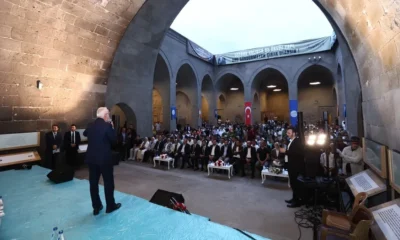
 Daily Agenda2 days ago
Daily Agenda2 days agoPresident Erdoğan was connected to the “Sözte Youth” program in Kayseri by phone.
-
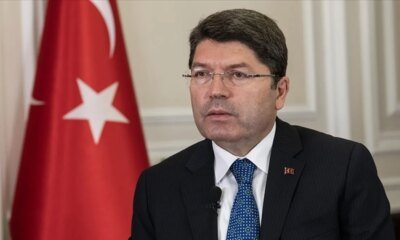
 Daily Agenda2 days ago
Daily Agenda2 days agoNew Period in Cadastral Disputes: Over 12 thousand files have been concluded
-

 Economy2 days ago
Economy2 days agoAustralian state aims to write into law rights on work from home
-
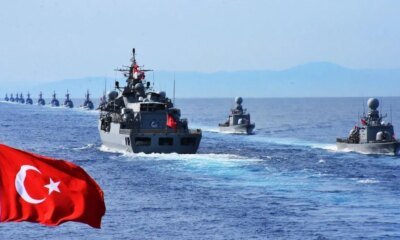
 Daily Agenda2 days ago
Daily Agenda2 days agoNew “Sea Protection Areas” added to Türkiye’s national maritime planning map
-
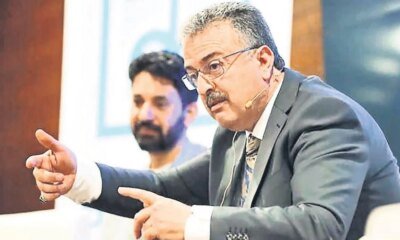
 Daily Agenda1 day ago
Daily Agenda1 day agoAK Party Political Academy became a turning point in Turkish politics
-

 Sports2 days ago
Sports2 days agoLuka Doncic signs $165M deal to extend Lakers stay by 3 years
-
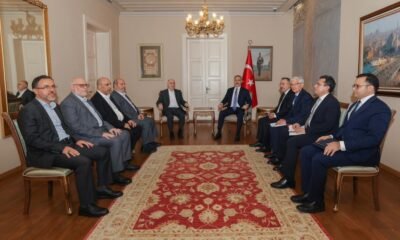
 Politics2 days ago
Politics2 days ago‘Israel intentionally stalling cease-fire talks to weaken resistance’
-
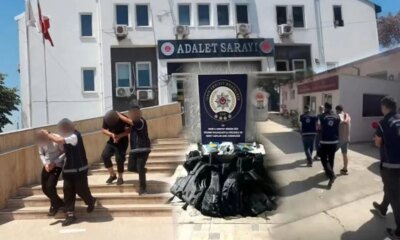
 Daily Agenda2 days ago
Daily Agenda2 days ago102 immigrant smugglers and 393 irregular immigrants were caught




